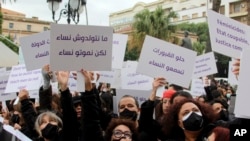In 1956, immediately after independence from France, Tunisian President Habib Bourguiba granted women citizenship rights.
The Personal Status Code, or family law, also eliminated polygamy, introduced a legal age for women to marry, granted women guardianship of their children in the event of the father’s death, and made it possible for women to initiate divorce for the first time.
The government also created the National Union of Tunisian Women to implement the reforms.
In recent days, International Women’s Day has played prominently on social media sites in Tunisia; mentioning examples of many unique achievements in women equality.
Nour Bouqdida is one of a few women in Tunisia who cut men’s hair.
Speaking to VOA, Nour says she chose men's shaving because, since she was a little girl, she had been watching videos about this type of shaving, and little by little she fell in love with it and decided to learn it.
She says her family was open to this choice, and they helped her open her own salon.
She says she was subjected to a lot of criticism on social media, but that was a great motivation to continue this profession.
The 1990s ushered in a second wave of legal reforms. President Zine El-Abidine Ben Ali created the Women’s and Family Affairs Ministry, a post for an adviser to the president on women’s affairs, and the Center for Studies, Documentation and Information on Women.
In 1993, the state reformed the Nationality Code to allow Tunisian mothers to pass their citizenship to their children born to non-Tunisian fathers.
The role of women in Tunisian society was seen in a confrontation led by women after the Arab Spring uprising protests in 2011.
Women had a decisive role in overthrowing the Islamist Ennahda movement.
Rajaa Chebbi is the granddaughter of the Tunisian Arab poet Abu al-Qasim Chebbi, who rose to the upper ranks of the Tunisian Ministry of Interior.
"In 1991, I succeeded in a competition with the Ministry of the Interior to join the law enforcement forces, eventually becoming the first woman to be promoted to the rank of General Commissioner, 1st category, in Tunisia and the Arab world. This wasn't something I had planned, but I worked hard, doing the best I could," Chebbi said.
Some Tunisian men worked hard for women equality.
Imed Zouari works with the aid organization Oxfam in Tunisia and has focused closely on women’s issues.
"The Feminist Movement in Tunisia is continuing the fight. For decades we have been looking for equality, to change the path of policies, laws and the social norms towards achieving equality of rights and law. That is a long way, but it will continue and it will one day be ordered," Imed said.
He and other activists, however, say they are concerned that rights of Tunisian women have been eroded somewhat, including when the constitution was revised in 2022, removing some of the language on women’s equality. Also, women faced harassment at the polls in the country’s 2022 election.










Forum